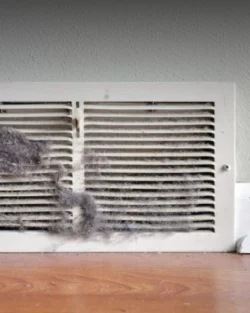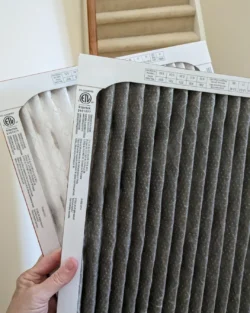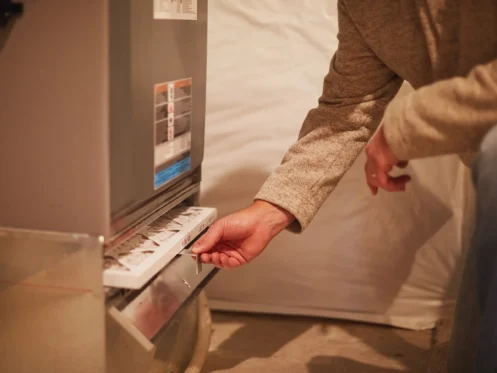When was the last time you changed your HVAC air filter? If you can’t remember, you’re not alone. Many Riverside homeowners put off this simple task, but it’s one of the most important steps in keeping your HVAC system efficient and your home comfortable.
A clean filter doesn’t just protect your unit—it protects your health, reduces energy waste, and extends the life of your HVAC system. Neglecting it, on the other hand, can lead to higher bills, more dust in your home, and costly repairs down the road.
So how often should Riverside homeowners replace their HVAC air filters? Let’s break it down.
Why HVAC Air Filter Replacement Matters in Riverside Homes

The role of air filters in indoor air quality
Air filters act as the first line of defense between outdoor air and your living spaces. In Riverside, pollen counts rise in the spring, wildfire smoke can drift in during late summer, and year-round smog creates extra particles in the air. Without a clean filter, those irritants circulate through your home.
For families with children, elderly relatives, or asthma sufferers, replacing your air filter regularly isn’t just routine maintenance—it’s a key part of protecting household health.
How filter condition impacts energy efficiency and system lifespan
A dirty filter restricts airflow, forcing your HVAC system to work harder. That extra strain doesn’t just spike your electric bill—it can shorten the lifespan of your unit.
Think of it like running a marathon while breathing through a straw. Eventually, the system overheats, wears down, and fails prematurely. Replacing a $15 filter every month or two is far cheaper than repairing a $3,000 air conditioner or furnace.
A dirty filter is one of the leading causes of breakdowns that result in costly emergency repairs.
Also Read: Why Is My Heater Not Working? Troubleshooting Tips for Riverside, CA Homeowners
Factors That Affect How Often You Should Replace Your Air Filter
Riverside sits in a valley where dust and smog tend to linger. On windy days, particles enter your home through open doors and windows and settle in the filter. In the spring, pollen from local trees like olive and mulberry builds up fast.
This means local homeowners often need to swap filters more frequently than the national average. While a filter in the Pacific Northwest might last three months, a Riverside filter could be dirty in just 30–45 days.

Household size, pets, and allergies
Every home is different. A single-person household without pets can usually stretch filter changes longer. But larger families—and especially those with pets—need more frequent replacements.
For example, a Riverside family of five with two dogs will likely need to replace their filters every month. Pet dander and fur clog up pleated filters quickly, and combined with outdoor air pollution, filters in these homes work overtime.
Filter type (basic fiberglass vs. pleated vs. HEPA)
Filter type is another key factor:
- Fiberglass filters are inexpensive but thin and only last about 30 days.
- Pleated filters offer stronger protection and typically last 60–90 days.
- HEPA filters capture the smallest particles but may clog faster in dusty environments like Riverside.
Pro tip: Always check the MERV rating (Minimum Efficiency Reporting Value). Higher numbers mean stronger filtration, but they can also restrict airflow if not replaced on time.
Recommended HVAC Air Filter Replacement Schedule for Riverside Homeowners

Standard guidelines (every 30–90 days)
HVAC professionals generally recommend replacing your filter every 30 to 90 days. But in Riverside, the “every 90 days” rule often doesn’t apply—local conditions demand a tighter schedule.
Adjustments for high-use seasons in Southern California
Summers in Riverside are hot and dry, with air conditioners running almost constantly. Winters bring chilly nights when furnaces stay active. Both seasons put extra demand on filters.
During these times, checking filters monthly is the safest approach. For homeowners debating whether a furnace or heat pump is better for efficiency in California’s climate,
Also Read: Heat Pump vs. Furnace: Which Is Better for Winter in California?
Signs your air filter needs immediate replacement
Sometimes, your HVAC system tells you the filter is overdue. Warning signs include:
- Higher-than-normal utility bills despite similar usage
- Weak airflow from vents
- Excessive dust on furniture and around registers
- Allergy or asthma flare-ups indoors
If you notice any of these, don’t wait for your next “scheduled” change—replace the filter right away.
Extra tip: Set a reminder
A simple way to stay on track is to set a phone reminder or write the replacement date on the filter’s frame. That way, you’ll always know when it’s time for the next swap.
The Bottom Line: Keeping Your HVAC Running Clean and Efficient in Riverside
For most Riverside homeowners, replacing an HVAC air filter every 30–60 days is the safest schedule. Larger households, pet owners, and allergy sufferers should lean toward monthly changes, while smaller, pet-free households may get away with every two months.
By keeping a fresh filter in place, you’ll:
- Improve indoor air quality
- Protect your HVAC system
- Save money on monthly energy bills
By keeping a fresh filter in place, you’ll improve air quality, protect your HVAC system, and save money on monthly energy bills.
Also Read: How New HVAC Systems Can Slash Energy Bills by $120/Month
For more expert guidance on air filtration, the EPA offers detailed insights into how HVAC filters improve indoor air quality (EPA.gov).
Ready to breathe cleaner air and keep your HVAC system running at its best? Schedule your filter replacement or maintenance today with Polar Express. Contact us here



